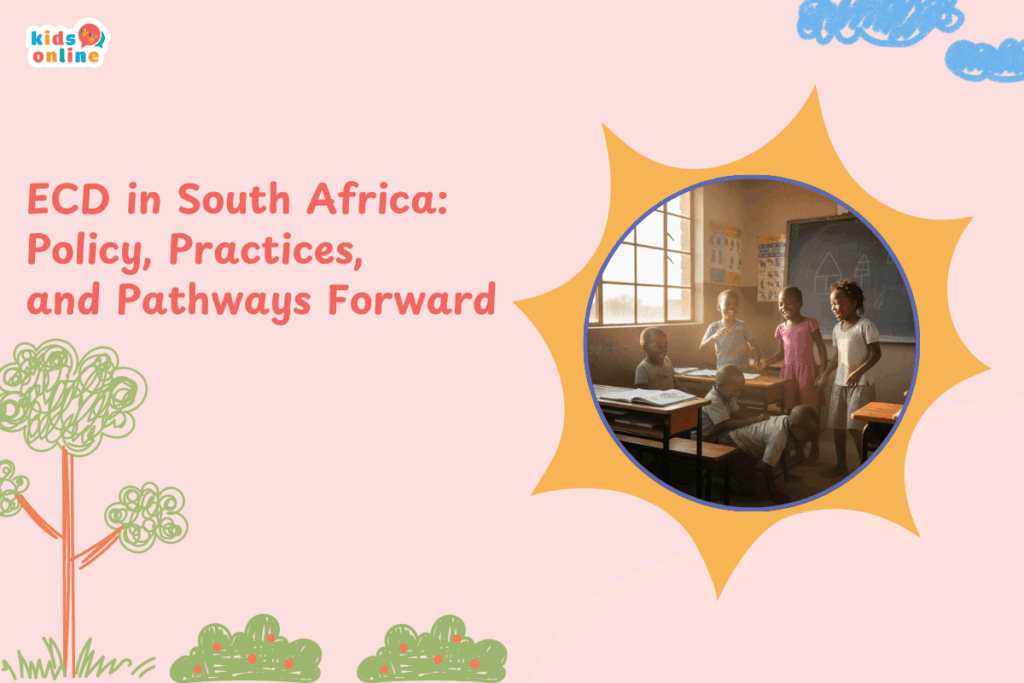South Africa’s Early Childhood Development (ECD) sector is vital: it covers children from birth to five years old and lays the foundation for their cognitive, emotional, physical, and social growth. The ECD Directorate under the Department of Basic Education (DBE) oversees policy, regulation, and standards for this critical phase.
While strides have been made in policy and infrastructure, many challenges remain in delivering quality, equitable ECD services across the country.
The Scope and Importance of ECD in South Africa
Mandate and Age Range
The ECD Directorate defines its scope as from birth to five years, a phase when children build their earliest capacities. This period is internationally recognized as crucial for brain development, social-emotional wellbeing, and school readiness.
National Policy & Vision
South Africa has integrated ECD into its national education framework. A National Integrated Early Childhood Development Policy aims to transform service delivery and close gaps in access, quality, and equity. Additionally, South Africa’s 2030 Strategy for ECD sets forth a roadmap to ensure universal access to two years of quality preschool by 2030.
Key Government Programmes & Regulatory Frameworks
ECD Programme Certification & Registration
To operate legally and access funding, ECD centers must register with the Department of Social Development (DSD) and comply with norms and standards. The certificate process involves meeting criteria around staff qualifications, child safety, curriculum, and inclusivity.
Government Funding & Subsidies
Government funding for ECD is channeled primarily through two routes:
- Subsidies to registered ECD centers based on eligible children (0–4 years) and caregiver income means testing
- Programme funding for non-center and non-profit initiatives
However, many ECD providers struggle to access these funds due to registration barriers, complex compliance requirements, and uneven reporting systems.
Interdepartmental Collaboration
Meaningful ECD implementation requires cooperation across departments (Education, Social Development, Health) as well as coordination between national, provincial, and municipal levels. The 2030 Strategy underscores the need for this integrated “social compact” among stakeholders.

Challenges in South Africa’s ECD Landscape
Uneven Access & Inequality
Children in impoverished or rural communities often lack access to formal ECD services, while children in better-resourced areas attend early learning centers of higher quality. This disparity reinforces inequality from early on.
Quality and Workforce Issues
Many ECD practitioners lack formal credentials or ongoing professional development. Inadequate training, mentorship, and resource support leads to inconsistent classroom practices and learner outcomes.
Infrastructure & Resources
ECD sites in low-income areas may lack safe and child-friendly facilities, learning materials, proper sanitation, and play equipment — all of which limit effective early learning.
Financial & Administrative Barriers
The registration process, compliance with health and safety standards, and municipal inspections pose major hurdles. Some ECD centers, particularly in underserved areas, face delays or denial in registration, blocking them from receiving subsidies.
Progress, Innovations & Opportunities
Expanding Public Investment
In 2023, the World Bank and South Africa’s Department of Basic Education launched a Public Expenditure and Institutional Review (PEIR) for ECD, aiming to optimize public spending and expand access. The review calls for focusing investments on actions with highest returns and targeting disadvantaged groups.
Policy Reform & Simplification
Stakeholders advocate for streamlining registration processes, relaxing overly rigid norms (while ensuring minimum quality), and improving the transparency of budget allocations for ECD.
Integration with Digital & EdTech Solutions
Emerging tools like ECD Information Hubs, digital monitoring systems, and AI-powered platforms present opportunities to improve teacher support, data tracking, parent communication, and program oversight.
Community Engagement & Capacity Building
Programs aiming to equip parents and caregivers with knowledge about child development can strengthen home learning environments. NGOs and professional bodies (e.g. South African Congress for ECD) play key advocacy and training roles.
The Path Forward — What South Africa Must Do
- Increase equitable access so every child, regardless of location or background, can participate in ECD programs
- Enhance workforce capacity through credentialing, continuous training, and mentorship
- Upgrade infrastructure & learning resources in underserved areas
- Simplify funding & registration systems to reduce barriers for ECD centers
- Leverage technology & data systems for transparency, efficiency, and quality assurance
- Foster collaboration among government, NGOs, the private sector, and communities
By focusing on these priorities and aligning efforts under the 2030 Strategy, South Africa can transform ECD services into a foundation for inclusive growth, social equity, and generational uplift.
>> Source: South Africa: Early Childhood Development








